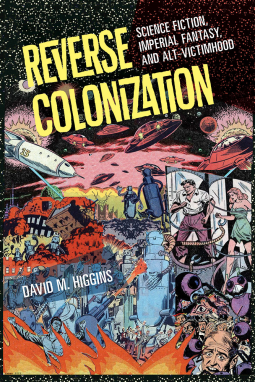
Reverse Colonization
Science Fiction, Imperial Fantasy, and Alt-victimhood
by David M. Higgins
This title was previously available on NetGalley and is now archived.
Send NetGalley books directly to your Kindle or Kindle app
1
To read on a Kindle or Kindle app, please add kindle@netgalley.com as an approved email address to receive files in your Amazon account. Click here for step-by-step instructions.
2
Also find your Kindle email address within your Amazon account, and enter it here.
Pub Date Sep 01 2021 | Archive Date Sep 01 2021
University of Iowa Press | University Of Iowa Press
Talking about this book? Use #ReverseColonization #NetGalley. More hashtag tips!
Description
LITERARY CRITICISM / POLITICS
Reverse colonization narratives are stories like H. G. Wells’s War of the Worlds, in which technologically superior Martians invade and colonize England. They ask Western audiences to imagine what it's like to be the colonized rather than the colonizers. David Higgins argues that although some reverse colonization stories are thoughtful and provocative, reverse colonization fantasy has also led to the prevalence of a very dangerous kind of science fictional thinking in our current political culture. It has become popular among groups such as anti-feminists, white supremacists, and far-right reactionaries to appropriate a sense of righteous, anti-imperial victimhood—the sense that white men, in particular, are somehow colonized victims fighting an insurgent resistance against an oppressive establishment. Nothing could be timelier, as an armed, far-right mob stormed the U.S. Capitol on January 6, 2021, in an effort to stop the presidential election from being “stolen from them.”
Higgins shows that this reverse colonization stance depends upon a science fictional logic that achieved dominance within imperial fantasy during the 1960s and has continued to gain momentum ever since. By identifying with fantastic forms of victimhood, subjects who already enjoy social hegemony are able to justify economic inequality, expansions of police and military power, climatological devastation, new articulations of racism, and countless other forms of violence—all purportedly in the name of security, self-defense, and self-protection.
Advance Praise
“Higgins’s thoroughly researched, well-grounded analysis of the science fictional roots of ‘imperial masochism’ is both timely and persuasive. It should become an important reference for work on Anglophone science fiction after WWII, and on the growth of neoliberal ideology and right-wing conspiracy theory in the later twentieth and early twenty-first centuries.”—John Rieder, University of Hawai‘i at Mānoa
“In reading Reverse Colonization, we discover the staggering extent to which the contemporary American political imagination—on all sides—has been furnished by science fiction. Higgins opens an exciting new direction for scholarship in exploring how and why science fiction’s images and fantasies have been so adaptable and so powerful.”—Scott Selisker, author, Human Programming: Brainwashing, Automatons, and American Unfreedom
Available Editions
| EDITION | Other Format |
| ISBN | 9781609387846 |
| PRICE | $39.95 (USD) |
Links
Featured Reviews
David M. Higgins presents an analysis of the stories that are so often found in the science fiction genre, exploring themes that resonate with lingering ideas and issues in our modern/postmodern world. Higgins shows why science fiction is such a powerful genre, and gives the reader much to consider through this critical approach.



